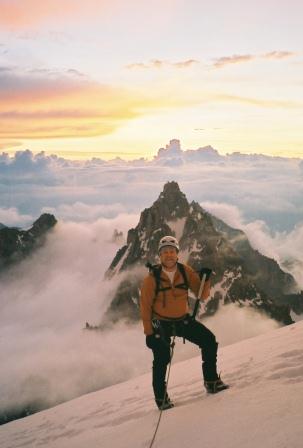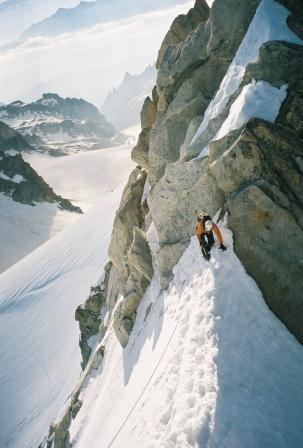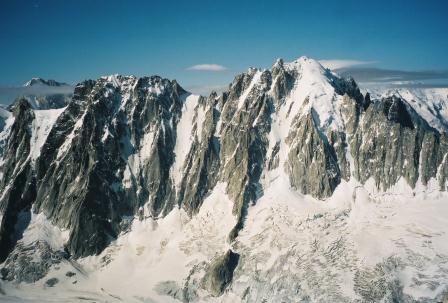Temporary Landlords
Rising abruptly from the Glacier du Tour, Aiguille du Chardonnet’s spiny backbone delineates the border between France and Switzerland. In 2009 my friend Yves and I set our sites on its Forbes Arête, considered one of the finest classic climbs in the Alps. From the safe confines of the Albert Premier Hut, our route looked like a climber’s fantasy, traversing the entire mountain from east to west along an impressively narrow arête with 50 degree icy slopes, airy ridges, and immense granite gendarmes.
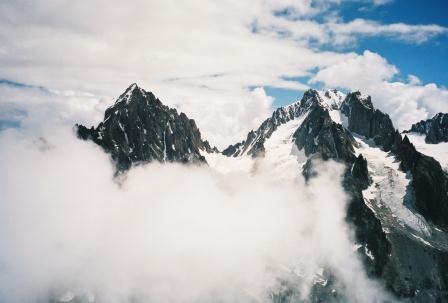
Aiguille d’Argentière on the right and Aiguille du Chardonnet on the left, I am fortunate to have climbed them both 
Aiguille du Chardonnet, the Forbes Arête follows the left skyline with glacier du Tour in the foreground 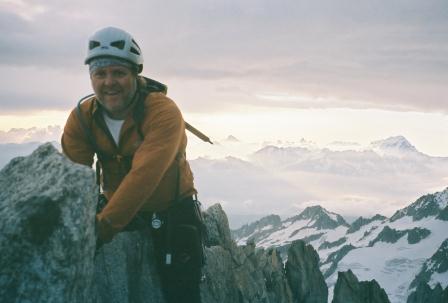
Climbing using a technique called au cheval with the Matterhorn’s crooked finger in the distant horizon
We left the next morning just after 2:00 a.m. and were immediately struck by the crisp chill rising up from the ice field below. In a few minutes our feet left the rocky moraine and joined the glacier du Tour where we soon got into the steady rhythm of glacier travel: inhale, step, step, plant the ax, exhale, step, step, plant the ax. This mantra soon becomes almost hypnotic, surrounded by darkness with only the sounds of your breath and crampons crunching through the new crusty layer of snow as your accompaniment.
There is a strange comfort in this pre-dawn isolation, 45 feet from your rope partner with your only illumination coming from a gibbous moon and your headlamp. It’s only the occasional glance left or right into the void, or an extra second as you wait for the rope to come tight that interrupts this litany of endless steps. After crossing the bergschrund and 300 feet of 50 degree snow, we reach the arête and are greeted by the rising sun. We stop and admire the surreal, Daliesque colors of dawn against the snowy flanks of the Alps. Far in the distance the crooked finger of the Matterhorn breaks the clouded horizon – perhaps another day.
The next hours are filled with easy rock scrambling and the uneasy sound of crampons scraping the same rocks that alpinist from every generation have touched innumerable times on this magnificent peak. The route finding is intricate, sometimes going over, sometimes around, and sometimes between the giant granite towers lining the ridge leading all the way to the 12,546-foot summit. We stop on the steepest sections to belay the hardest pitches giving each of us a few sacred moments to take in the awesome grandeur and beauty only found in the high mountains. Waiting to climb, I take in the breathtaking views of Les Droites; its ice fingers stretching from its broad ridge all the way down to the Argentiere glacier – Yves hunts for crystals.
My heavy breathing is finally rewarded by the corniced summit ridge leveling off for an airy traverse to a tiny summit; a few thought provoking well-placed steps and we are the temporary landlords of the most overwhelming four-foot square on earth. Words fail description for this snowy pinnacle of real estate earned through a spirit of adventure and a few ounces of physical suffering. These are moments when you realize just how dulled life below the snow couloirs and icy flanks truly is. There is a simple truth in the mountains, a truth that seems elusive in the valleys and plains of life far below this sacred place.
Looking down I traced our line of descent knowing the next 1,000 feet would be just as harrowing as our ascent; down several very steep, ice chocked gullies, hours of loose rocks and verglassed faces to the top of the Col Supérieur Adams Reilly. From there the glacier du Tour makes its turn left and down the valley to the quaint village of Argentiere. Slowly the layers of single-mindedness recede, one at a time, and my thoughts drift from the serenity and solitude of the mountains to life below the summits and peaks.
You cannot stay on the summit forever; you have to come down again. So why bother in the first place? Just this:
What is above knows what is below, but what is below does not know what is above. One climbs, one sees. One descends, one sees no longer, but one has seen. There is an art of conducting oneself in the lower regions by memory of what one saw higher up. When one can no longer see, one can at least still know.
– René Daumal


